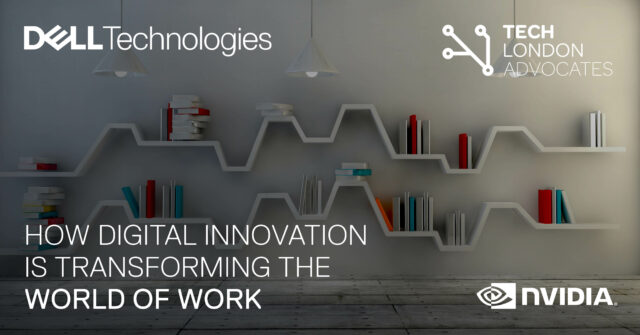
By Paul Harrison
Introducing the Digital Debates
Dell Technologies’ commitment to driving human progress through technology puts us at the heart of this conversation. Indeed, 65% of our workforce globally now work in a flexible capacity and our customers are following a similar trajectory, looking to leverage our expertise and solutions.
And so, to accelerate the conversation around the future of work, we addressed the topic in the first of our new series of ‘Digital Debates’, curated in partnership with Tech London Advocates (TLA) and NVIDIA.
Our first debate saw two brilliant leaders – Jason Stockwood, chair of Grimsby Town Football Club and co-founder of 53 Degrees Capital, and Devyani Vaishampayan, CEO of the HR Tech Partnership – join myself, NVIDIA’s Rik Thwaites and our host, TLA founder Russ Shaw CBE, to discuss the future of work through the lens of technological impact, new working models, talent acquisition, and powering purpose.
Here were my key take-aways from the discussion.
We must go further than technology enablement
The panel suggested that the next 20 years will be nothing like what has come before, in terms of the advancement of technology, from AI and Machine Learning to quantum computing. And so, while these present incredible opportunities, there are deliberate choices we should make to ensure digitisation enables greater happiness for people.
‘Businesses should reflect on their hierarchies and look at how technology can turn the whole concept of people management upside down’
At Dell Technologies, we use technology to not only address business requirements and efficiency, but focus on how we can support our employee’s well-being. It was highlighted that as technology enables greater productivity, then we should consider allocating the benefits of that to our people and give them more choice around when and where they work. NVIDIA’s Rik Thwaites similarly called for a better understanding of how technology can enable people not only to be more efficient, but deliver outcomes across the board: bringing more to the environment, productivity and industry.
We must make flexibility work for everyone
The future of work is not about specific working models, but leaders being connected to their teams and understanding what their individual members require, how they perform at their best, and tailoring their experience. That is how employers will get the most out of their people, and their people the most out of their employers.
It was suggested that we should avoid only focusing on working models in future of work conversations and look at more holistic issues of organisational design. Businesses should reflect on their hierarchies and look at how technology can turn the whole concept of people management upside down.
We must use the future of work to make an impact
While technology is delivering for workplace productivity and connectivity, it also provides opportunity for organisations to make an impact on society more widely and deliver on their purpose. Our panellists believe that it should serve higher level considerations, such as compassion and empathy, rather than simply be seen as a tool for greater productivity and efficiency.
Technology can also be used to foster more diverse and inclusive organisations, which is one of Dell’s moonshot goals, as it is both the right thing to do and something that is better for business in terms of productivity, creativity and investor returns. Organisations can set targets that will allow leaders to understand where there can be improvement in their business.
To find out more about how technology can benefit your business and deliver for your people, you can read the summary of our Breakthrough study here.
And you can watch the full Digital Debate here.


